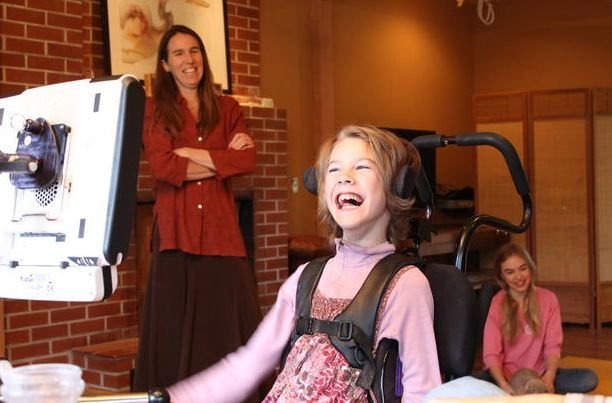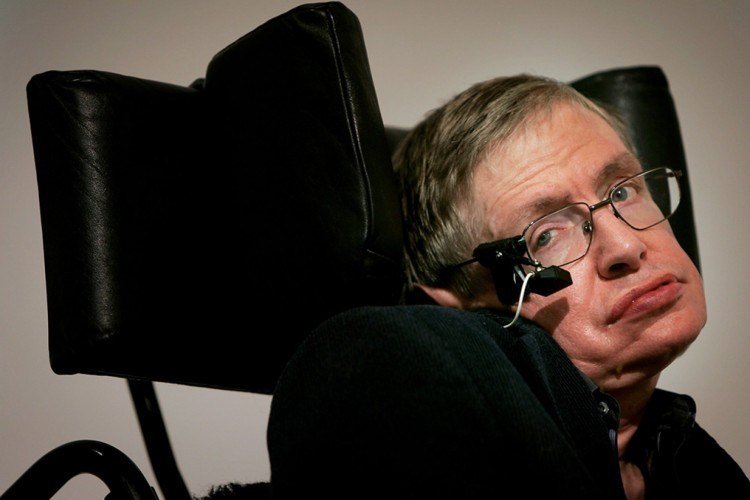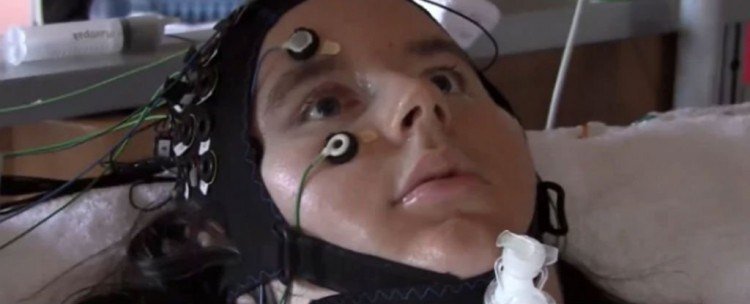Have you ever seen the film Scuba Diving Mask and Le Scaphandre et le Papillon? If you do not, I advise you to watch it very soon; and thank me for this later!

The film describes Bobby's life after suffering from a heart attack and stroke at the age of 43, which affected a condition known as Locked-In Syndrome or Syndrome. The situation has paralyzed him; leaving him only one way to communicate with the outside world is to blink with the eyelid of the left sample only!
Locked-in syndrome is a condition also known as Lou Gehrig's Disease, in which the patient is awakened and conscious but unable to communicate orally with others because he is in complete paralysis of all his voluntary muscles except the muscles of the eyes. But it is much worse with the syndrome of the total incarcerator, which represents a more severe case in which the patient loses even the ability to control the eyes unfortunately!

Despite the wonderful laugh on the face of the angel above, the situation is absolutely tragic, one feels that his soul will be lost just to think about it, let alone who is going through that terrible experience! Thus, we may think that those who suffer from them think only of dying for salvation, but that idea has changed completely with the latest revolutionary device that scientists have reached to read what the mind thinks.
Of course, I thought of the case of living legend Stephen Hawking, the famous physicist, with the revolutionary device he uses to give him a voice that sometimes speaks to the masses and sometimes composes books. Hawking's situation is different from what we are talking about here. Hawking has ALS (Amyotrophic lateral sclerosis), a fatal disease that can not be treated. It causes the atrophy of the nervous system caused by the atrophy of the motor nerves and neurons in the central nervous system that control the movement of voluntary muscles. But despite the effects of this dreaded disease, it does not cause complete paralysis of all the muscles of the body. The sphincter muscles of the intestines, bladder and muscles responsible for the movement of the eye usually do not survive this effect. This is what happened with Hawking.

In collaboration with the Intel giant, the Hawking mobile chair is equipped with a computer that can write on the screen through a device that acts as a sensor installed on Steven's glasses and translates signals from "cheek muscles" into commands by which to select words on the screen to form sentences. These sentences to the sound! Something amazing, right? However, this wonderful device does not work unfortunately with the syndrome of the total incarcerator, because even the cheek muscle or eyelashes paralyzed, too.
But that tragic situation is about to change for the better as scientists and researchers in Europe have reached a device with a revolutionary interface linking the mind to the computer and already experienced four patients with the syndrome of the total detainee have lost the ability to control all voluntary muscles, whether due to Lou Gehrig's disease or ALS.

The device is designed by renowned neuroscientist Niels Birbaumer and is being tested at the Wiess Center for Bio and Neuroengineering in Geneva. Where the cover is like a swimming cap on the head of the patient and then read and measure the electric waves sent from the brain as well as the flow of blood and the interface of the device, which is the same method known as close-infrared spectroscopy of the near-infrared spectroscopy.
You wonder what was the answer of the four patients under examination?
When asked: Do you love life? Three of them answered "yes". Point.
When asked: Are you happy? They all answered that. They did not ask the fourth patient, who is only 23 years old, any open questions because her parents were afraid of her over-excited eyes. This really breaks the heart ...

To make sure that the four patients are already communicating with them and that they are not receiving false answers or misleading signals, Perpomer asked the patients for 10 full days to answer yes or no to a number of personal questions and wrong phrases such as "You were born in Berlin" or " Germany, "and compare their recorded ideas with patterns of brain signals and blood flow. Surprisingly, the answers they received were 70% constant all the time, eliminating doubts that these signals and their responses are not random but conscious.
This happened to parents and relatives sweeping. After a long, painful silence, they can tell if the prisoners are motionless and wish to continue with life.
The function of the new device is not only to communicate with patients with CFS, it can also be used as a diagnostic tool to determine if the patient is conscious or not, according to Dr. Perbomer says that there are many cases that are misdiagnosed as a complete coma. It is hoped that this technique will evolve to allow trapped patients to choose letters for future communication beyond just answering yes or no questions
Dear ones ... Hold on, we can hear you!